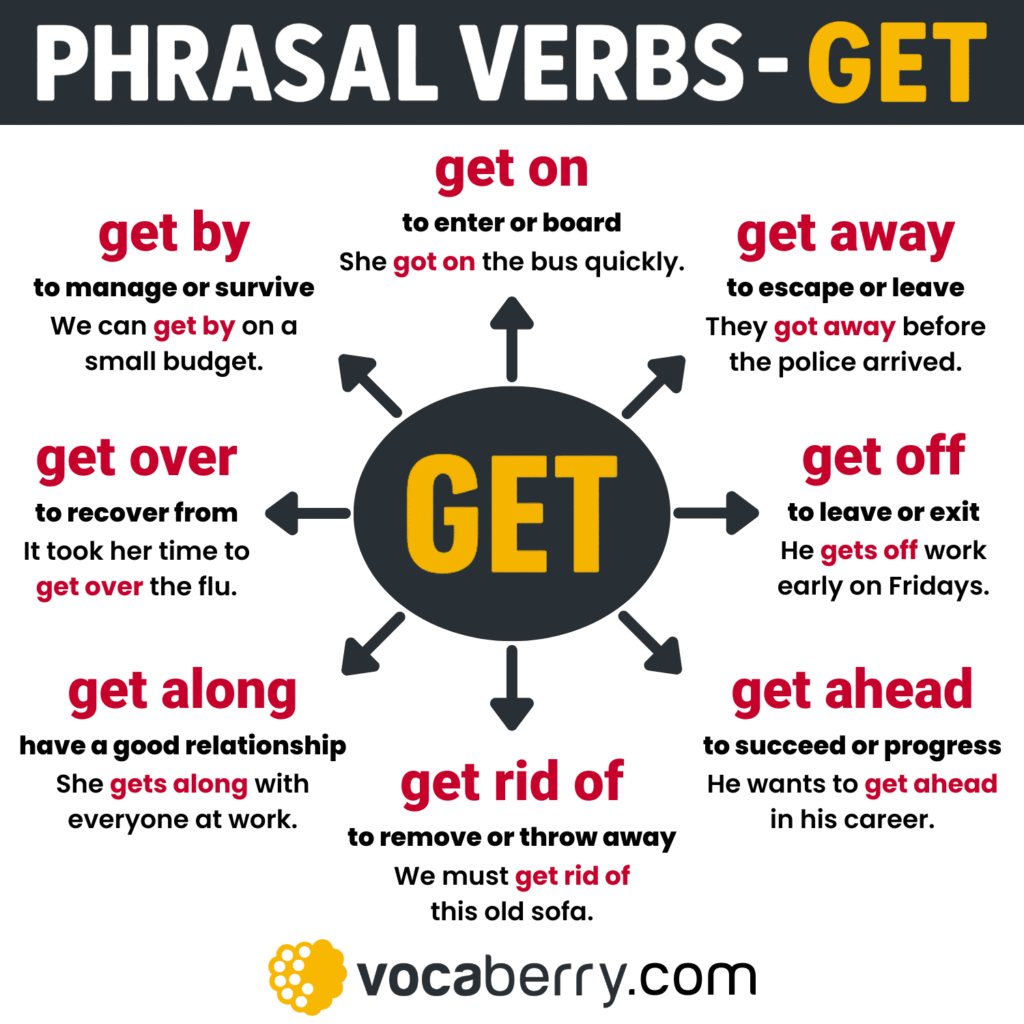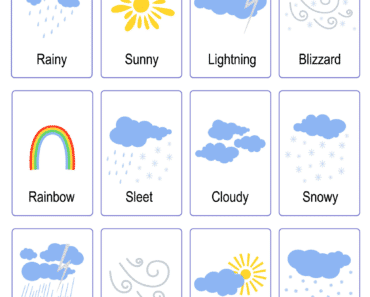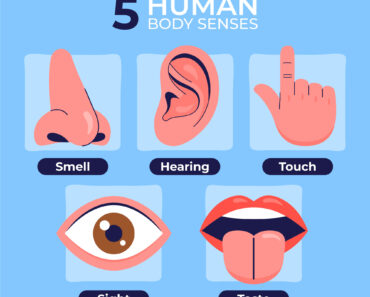
Phrasal verbs are expressions made by combining a verb with a preposition or adverb to create a new meaning. The verb get appears in many common phrasal verbs in English. These combinations are important to learn because their meanings are often different from the meaning of get by itself. This guide explains the most frequent phrasal verbs with get, including their meanings and examples.
30 Phrasal Verbs with Get: Meanings and Examples
Below you will find a list of the most common phrasal verbs with get. Each combines get with a preposition or adverb to create a specific meaning. It also includes clear meanings and examples used in everyday English.
1. Get up
Meaning: To rise from bed or to stand up.
Examples:
- I get up at 6:30 every morning.
- He got up to greet the visitors.
2. Get down
Meaning: To lower yourself physically, to make someone feel sad, or to start working seriously.
Examples:
- The cat got down from the table.
- The bad weather is really getting me down.
- Let’s get down to business.
3. Get on
Meaning: To board a vehicle, to make progress, or to have a good relationship.
Examples:
- She got on the bus just in time.
- How are you getting on with your project?
- They get on very well.
4. Get off
Meaning: To leave a vehicle, to finish work, or to avoid punishment.
Examples:
- We need to get off at the next stop.
- I get off work at 6 p.m.
- He got off with only a warning.
5. Get over
Meaning: To recover from illness, disappointment, or difficulty.
Examples:
- She got over the flu quickly.
- It took him a long time to get over the breakup.
6. Get along (with)
Meaning: To have a friendly relationship with someone.
Examples:
- I get along with my colleagues.
- Do you get along with your neighbors?
7. Get around
Meaning: To travel from place to place, to avoid or overcome something, or for news to spread.
Examples:
- It’s easy to get around the city by bus.
- He always manages to get around the rules.
- News of their engagement quickly got around.
8. Get across
Meaning: To communicate an idea clearly.
Examples:
- She used examples to get her point across.
- He struggled to get the message across.
9. Get ahead
Meaning: To make progress or succeed.
Examples:
- She works hard to get ahead in her career.
- It’s not easy to get ahead without help.
10. Get at
Meaning: To suggest or imply something indirectly.
Examples:
- What are you getting at?
- Are you getting at the idea that this is my fault?
11. Get away
Meaning: To escape or to go on vacation.
Examples:
- The thief managed to get away before the police arrived.
- We’re planning to get away for the weekend.
12. Get back
Meaning: To return to a place or to regain possession of something.
Examples:
- When did you get back?
- I hope to get back my watch.
13. Get in
Meaning: To enter a place or vehicle, or to arrive.
Examples:
- Please get in the car.
- What time did you get in last night?
14. Get out
Meaning: To leave a place, to remove something, or for information to become known.
Examples:
- Get out of my room!
- I need to get the stain out.
- The news got out eventually.
15. Get through
Meaning: To finish something, to contact someone by phone, or to survive a difficult situation.
Examples:
- I need to get through this paperwork today.
- I couldn’t get through to her all morning.
- He got through a tough year.
16. Get together
Meaning: To meet with people socially.
Examples:
- Let’s get together this weekend.
- The family got together for a holiday dinner.
17. Get by
Meaning: To manage or survive with limited resources.
Examples:
- We don’t earn much, but we get by.
- He can get by on very little sleep.
18. Get back at
Meaning: To take revenge on someone.
Examples:
- She wanted to get back at him for the prank.
- He got back at his rival later.
19. Get on with
Meaning: To continue doing something.
Examples:
- Let’s get on with the meeting.
- She got on with her life after moving away.
20. Get rid of
Meaning: To remove or throw something away.
Examples:
- I need to get rid of these old clothes.
- He finally got rid of the bad habit.
21. Get into
Meaning: To enter a place or vehicle, to start being involved in something, or to be accepted into a school or organization.
Examples:
- He got into the car quickly.
- She got into yoga last year.
- He got into a top university.
22. Get out of
Meaning: To avoid doing something or to leave a vehicle or place.
Examples:
- She always tries to get out of doing chores.
- He got out of the taxi.
23. Get after
Meaning: To nag, scold, or pursue someone.
Examples:
- You should get after him about his homework.
- The coach got after the players for being late.
24. Get over with
Meaning: To complete something unpleasant.
Examples:
- Let’s get this over with quickly.
- She wanted to get the dentist appointment over with.
25. Get around to
Meaning: To finally do something you have delayed.
Examples:
- I haven’t gotten around to fixing the sink yet.
- She finally got around to calling her friend.
26. Get ahead of
Meaning: To move in front of something or someone.
Examples:
- Try not to get ahead of yourself.
- He likes to get ahead of his competitors.
27. Get away with
Meaning: To do something wrong without being punished.
Examples:
- He thought he could get away with cheating.
- Don’t let them get away with that behavior.
28. Get to
Meaning: To arrive at a place, to start doing something, or to affect someone emotionally.
Examples:
- When did you get to the office?
- Let’s get to work.
- The criticism really got to him.
29. Get down to
Meaning: To start doing something seriously.
Examples:
- Let’s get down to studying.
- We should get down to business.
30. Get up to
Meaning: To do something, especially something mischievous or surprising.
Examples:
- What did you get up to last night?
- The kids got up to all sorts of mischief.
Quiz: Phrasal Verbs with Get
1. I usually ____ at 7 a.m. to get ready for work.
a) get up
b) get on
c) get by
2. She was tired, but she decided to ____ with her homework.
a) get over
b) get up
c) get on
3. He finally ____ the flu after two weeks.
a) got over
b) got ahead
c) got through
4. If you don’t understand, I’ll try to ____ the idea more clearly.
a) get down
b) get across
c) get in
5. We ____ the bus just before it started moving.
a) got on
b) got away
c) got ahead
6. The new manager is friendly, and everyone ____ with him very well.
a) gets along
b) gets away
c) gets ahead
7. She decided to ____ all the old clothes she didn’t wear anymore.
a) get along with
b) get rid of
c) get over
8. Let’s ____ to business and start the meeting.
a) get down
b) get over
c) get by
9. He worked hard to ____ in his company and finally became a manager.
a) get along
b) get ahead
c) get around
10. They planned to ____ for the weekend to relax in the countryside.
a) get off
b) get away
c) get through
Quiz Answers
1) get up
2) get on
3) got over
4) get across
5) got on
6) gets along
7) get rid of
8) get down
9) get ahead
10) get away






